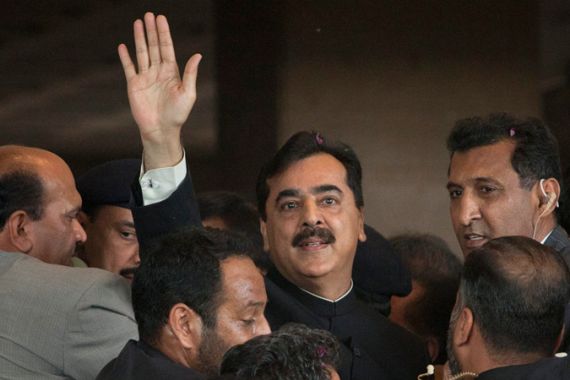Pakistan PM defies rivals’ calls to resign
Prime Minister Yousuf Raza Gilani refuses demands from opposition that he step down over contempt of court conviction.

Yousuf Raza Gilani, the Pakistani prime minister, has refused to step down a day after his conviction of contempt of court by the country’s Supreme Court brought resignations calls from the opposition.
In a fiery speech at the parliament on Friday, Gilani said “there is no law to remove an elected prime minister, parliament is the supreme authority and only this parliament has the authority to remove me”.
Gilani, Pakistan’s longest serving prime minister, was on Thursday convicted for refusing to open a corruption probe
against his boss, President Asif Ali Zardari. But the court handed him a symbolic sentence of less than a minute’s detention.
After the announcement of the verdict, Nawaz Sharif, the leader of the main opposition PML-N party, demanded that Gilani resign immediately “without causing further crisis”.
Gilani has argued that the constitution gives the president immunity from prosecution.
His “crime was protecting the constitution”, Gilani said at the parliament, and challenged opposition leaders to table a no-confidence motion against his rule “if they think they have principles and scruples and high moral grounds”.
Gilani appeal
Aitzaz Ahsan, Gilani’s lawyer and a sitting senator representing the ruling PPP, said that his client would be appealing the verdict.
Irfan Qadir, the country’s attorney-general and a PPP loyalist, meanwhile, termed the court order “absolutely illegal”.
“This order is to be ignored,” he said.
| IN VIDEO |
|
|
| Talk to Al Jazeera: Yousuf Raza Gilani |
The prime minister had faced a maximum sentence of six months in jail in the case, but was subjected only to a symbolic detention until “the rising of the court”.
Reading the verdict, Justice Nasir-ul-Mulk said Gilani’s offence “tends to bring this court and the judiciary of the country into ridicule”.
The court was ruling whether Gilani was guilty of committing contempt of court by failing to obey its order to write to authorities in Switzerland requesting them to reopen a corruption case against Zardari.
Zardari and former prime minister Benazir Bhutto, his late wife, were suspected of having used Swiss bank accounts to launder more than $10m, allegedly paid in bribes by companies seeking customs inspections contracts in the 1990s.
The court had ordered Zardari’s case, and several others, reopened after it struck down the National Reconciliation Ordinance, a controversial 2007 amnesty law, as being unconstitional.
Gilani says that reopening a case against a sitting president would itself be unconstitutional, as the holder of the post enjoys legal immunity while in office.
The contempt case, in court since January, has caused political instability and could force the holding of early elections if Gilani is finally disqualified from parliament and legislators cannot agree on a replacement.
Disqualification process
Even though he was convicted by the seven-member bench on Thursday, disqualification from holding public office is not a straightforward affair.
“The speaker of the National Assembly [the lower house of parliament] will be informed to process his disqualification as an MP on the basis of the conviction,” Rashid Rizvi, a former supreme court judge, said.
“The speaker has to write to the Election Commission of Pakistan within 30 days after the verdict to unseat the prime minister.”
The Election Commission would then have a further 90 days to make a decision on the case.
Gilani also has the right to appeal to a larger supreme court bench, Rizvi said, meaning the process could continue until an election date is announced.
“Since he is prime minister, the court can also suspend its own order for 15 days to enable his counsel to file an appeal,” he said.
Were Gilani’s government’s to see out its term until March 2013, it would be the first democratically elected government to do so. Gilani is already the longest-serving prime minister in Pakistan’s chequered history with democracy.